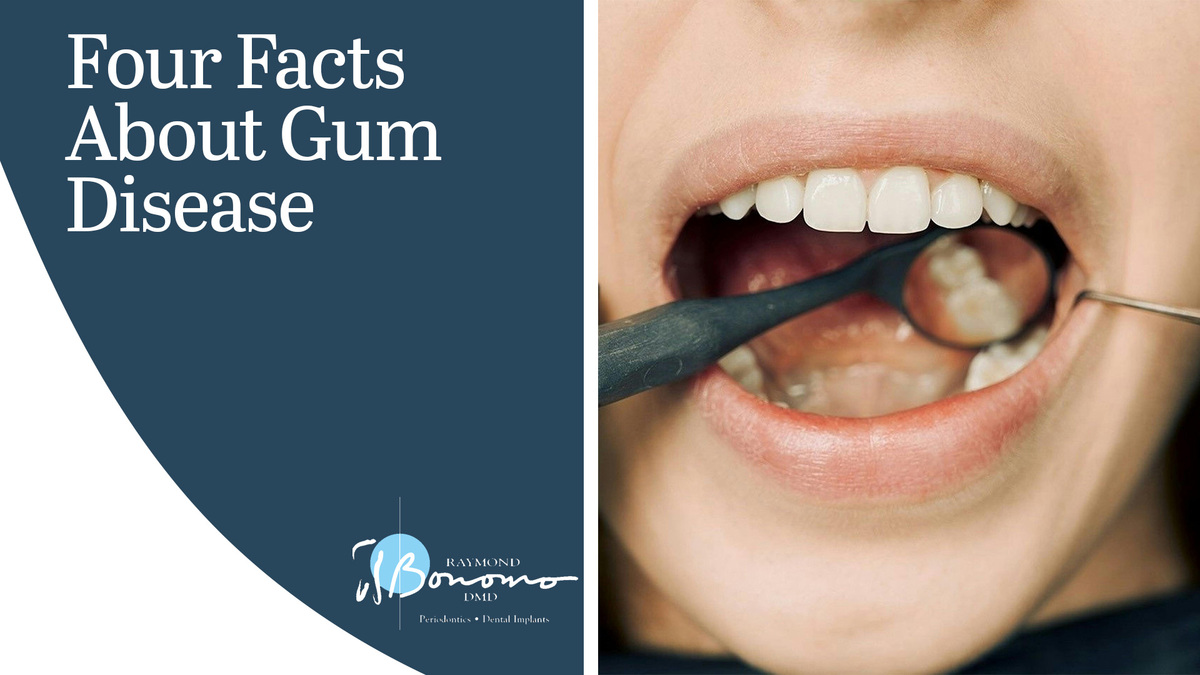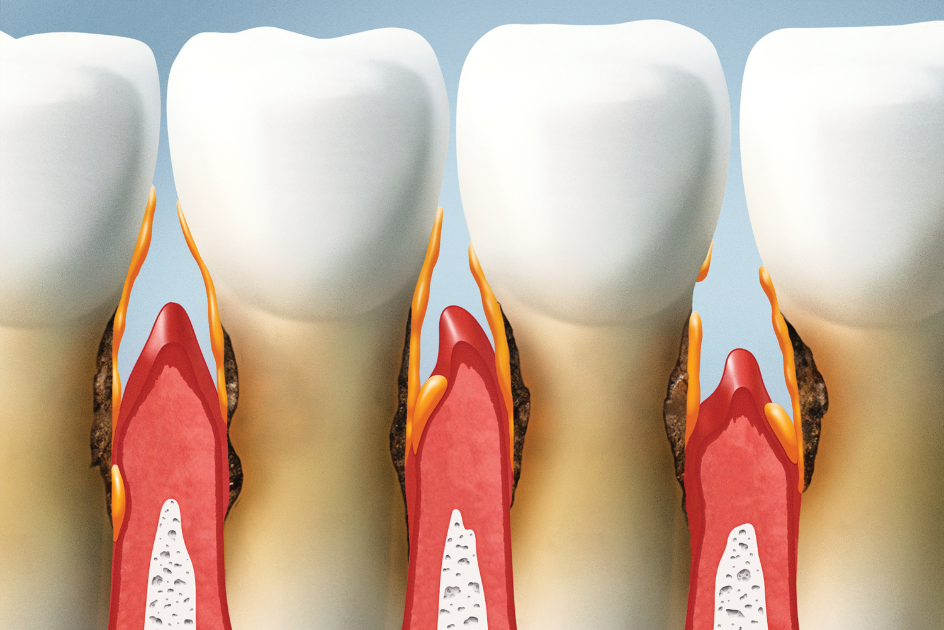Four Facts About Gum Disease

Gum disease is one of the most overlooked areas of health and wellness. However, this shouldn't be the case. Your gums are some of the most important parts of your body. They help with chewing, drinking, speaking, and even breathing. For this reason, looking after your gum health and pursuing treatment if you notice signs of gum disease is an important part of your oral health routine.
April is Oral Cancer Awareness Month! Despite this, many people know very little about gum disease and often think that the only downside of poor gum health is bad breath or a short infection. The truth is much more serious. Gum disease can lead to tooth loss, bacterial infection, and even heart disease.
It is important that you know the warning signs of gum disease and pursue help if you notice symptoms of periodontal disease. Regular oral hygiene is just a small part of maintaining gum health, being proactive about your gums is the best thing you can do to ensure that they stay healthy for years to come.
In this post, we will discuss four facts about gum disease that you should know. We will touch on how many adults show signs of gum disease, diabetes and tobacco use, tooth loss, and more.

Four Facts You Need to Know about Gum Disease
Gum disease or periodontal disease is a common oral health condition that affects many people worldwide. It is essential to understand its causes, symptoms, and potential consequences to prevent long-term damage to oral health.
There are also many misconceptions out there about what gum disease is, how it affects our health, and the proper path of treatment. We have assembled four facts about gum disease that address some of the common misconceptions we hear every day.
Fact: 46% of Adults over Age 30 Show Signs of Gum Disease
Statistics show that, a concerning, 46% of adults over the age of 30 display signs of gum disease. This high prevalence has significant implications for public health and individual well-being.
This statistic highlights the widespread nature of gum disease, indicating that it is a major oral health issue affecting a significant proportion of the population. It emphasizes the need for increased awareness and preventive measures to tackle this problem effectively.
Gum disease is not just limited to oral health; it has been linked to several systemic health conditions. Research has shown associations between gum disease and an increased risk of cardiovascular diseases, diabetes, respiratory illnesses, adverse pregnancy outcomes, and even certain types of cancer.
Symptoms of gum disease can be severe. Untreated gum disease can lead to painful consequences. In the initial stages of gum disease, you may experience gingivitis, characterized by inflammation, redness, and bleeding of the gums. If left untreated, it can progress to periodontitis, involving the destruction of bone and soft tissues supporting the teeth. This can lead to painful tooth loss. Moreover, untreated gum disease can exacerbate systemic health conditions, as mentioned earlier, further compromising an individual's overall health.
Worried about the costs of dental care? Insurance coverage can help! Learn more about how to navigate insurance coverage for dental care here!
Fact: Gum Disease can Contribute to Diabetes, Tobacco Use, a Weakened Immune System, and Poor Oral Hygiene
Gum disease is inflammation and infection of the gums that can lead to serious oral health issues if left untreated. There are several risk factors associated with gum disease, including diabetes, tobacco use, a weakened immune system, and poor oral hygiene.
Diabetes is a chronic condition that affects the body's ability to process sugar, leading to high blood glucose levels. This can weaken the blood vessels and negatively impact the gums' ability to fight off infection, making individuals with diabetes more susceptible to gum disease. It is essential for diabetic patients to manage their blood sugar levels effectively to reduce their risk of developing gum disease.
Tobacco use, whether it is smoking or chewing tobacco, can have detrimental effects on oral health. Nicotine and other harmful chemicals in tobacco products can reduce blood flow to the gums, making them more susceptible to infections. Smoking also weakens the immune system, making it harder for the body to fight off gum disease-causing bacteria. Quitting tobacco use is crucial in preventing gum disease and improving overall oral health.
A weakened immune system, which can be caused by certain medical conditions or medications, can compromise the body's ability to fight off infections, including gum disease. It is particularly important for individuals with a weakened immune system to maintain good oral hygiene practices and receive regular dental check-ups to catch and treat any signs of gum disease early.
Poor oral hygiene is one of the primary risk factors for gum disease. Inadequate brushing and flossing allow plaque to build up on the teeth, leading to gum inflammation and infection. Regular brushing, flossing, and professional cleanings are essential for removing plaque and preventing gum disease.

Fact: Gum Disease is the Leading Cause of Tooth Loss
Gum disease is the primary cause of tooth loss globally. Understanding how infected gums recede and erode the jawbone is crucial in comprehending why gum disease surpasses cavities as the main trigger for tooth loss.
Infected gums, resulting from the buildup of plaque and tartar, undergo a process known as gum recession. This occurs when the bacteria present in the plaque infect the gum tissues, causing them to pull away from the teeth. As the infection progresses, the gum tissue recedes, gradually exposing more of the tooth roots. Consequently, the roots become susceptible to decay and can be easily damaged.
Furthermore, gum disease can lead to the erosion of the jawbone, which plays a vital role in supporting the teeth. The inflammation caused by the infection triggers the release of enzymes that gradually break down the jawbone structure. Over time, the eroded jawbone loses its density and becomes weaker, resulting in a lack of adequate support for the teeth. Consequently, the teeth become loose and can eventually fall out.
Gum disease surpasses cavities as the main cause of tooth loss because it affects the foundation of the teeth. Unlike cavities, which primarily target the tooth structure, gum disease directly attacks the gums and the supporting bone. This makes gum disease a significant risk factor for tooth loss, especially in its advanced stages.
How often should you have a dental exam if you have gingivitis? Learn more in this blog!
Fact: Gum Disease is Contagious
Periodontal disease can be considered contagious as it can spread from person to person through saliva. This occurs due to the presence of bacteria in the saliva, which can be passed on during close contact or through shared objects.
When an individual with gum disease talks, coughs, or sneezes, they release bacteria-laden saliva into the air. These airborne pathogens can be inhaled by others, leading to potential infection. Additionally, activities such as kissing or sharing eating utensils, toothbrushes, or dental floss can transfer the bacteria directly from one person to another.
Several risk factors can increase the chances of contracting gum disease. For instance, individuals with diabetes are more susceptible to gum disease due to their impaired ability to fight infections. Tobacco use, such as smoking or chewing tobacco, can also weaken the immune system and damage gum tissues, making them more vulnerable to bacterial invasion.
Treat Your Gum Disease with Bonomo Periodontics
Gum disease is a serious matter. Not only can it lead to tooth decay and mouth pain, but it can also lead to more serious issues like bone loss. To make matters worse, it can contribute to and be worsened by complications like weakened immune systems, diabetes, and heart disease.
It is imperative that you get your gums taken care of immediately if you notice signs of gum disease. A trip to the periodontist could save you from immense pain and further medical complications down the line.
If you notice signs of gum disease, then it is time to schedule an appointment with Bonomo Periodontics. Dr. Raymond Bonomo is the foremost expert on periodontal care in the Cincinnati area and he is here to help treat your teeth and gums to help you return to a pain-free smile that you can be proud of.
Click here to schedule an appointment today!
Follow Bonomo Periodontics on Facebook for more information! Happy with the difference Bonomo Periodontics has made in your life? Leave us a five-star review here!

